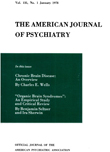Is modern-day schizophrenic outcome still negative?
Abstract
To evaluate formulations about more positive outcome in modern-day schizophrenic patients, the authors assessed 132 young patients 2.7 years after hospital discharge. Despite modern treatment techniques, only 14%-17% of the 79 schizophrenic patients in the study group were functioning effectively without relapses; 50% had adjusted very poorly. The schizophrenic patients were functioning significantly more poorly than the nonschizophrenic patients in all areas (p less than .01), showing poor adjustment, high symptom levels, and high rehospitalization rates. The two major acute subgroups (schizo- affective and acute schizophrenic patients) were functioning better than those with paranoid and chronic schizophrenia. Overall, the authors conclude, diagnosis carries prognostic implications. Schizophrenic outcome is more favorable today than it was in Bleuler and Kraepelin's era, but it is still relatively negative.
Access content
To read the fulltext, please use one of the options below to sign in or purchase access.- Personal login
- Institutional Login
- Sign in via OpenAthens
- Register for access
-
Please login/register if you wish to pair your device and check access availability.
Not a subscriber?
PsychiatryOnline subscription options offer access to the DSM-5 library, books, journals, CME, and patient resources. This all-in-one virtual library provides psychiatrists and mental health professionals with key resources for diagnosis, treatment, research, and professional development.
Need more help? PsychiatryOnline Customer Service may be reached by emailing [email protected] or by calling 800-368-5777 (in the U.S.) or 703-907-7322 (outside the U.S.).



